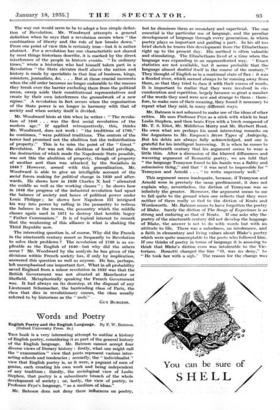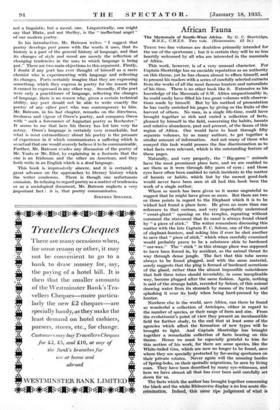Words and Poetry
English Poetry and the English Language. By F. W. Bateson. (Oxford University Press. 6s.) Tins book is a very interesting attempt to outline a history of English poetry, considering it as part of the general history of the English language. Mr. Bateson- cannot accept four diverse views of literary history : firstly, what one might call the " examination " view that poets represent various inter- acting schools and tendencies ; secondly, the " individualist " view that English poetry is, as it were, a pageant of men of genius, each creating his own work and being independent of any tradition ; thirdly, the sociological view of Leslie Stephen, that poetry is a subordinate branch of the whole development of society ; or, lastly, the view of poetry, in Professor Frye's language, "as a medium of ideas."
Mr. Bateson does not deny these influences on poetry,
but he dismisses them as secondary and superficial. The one essential is the particular use of language, and the peculiar. development of language through every generation, in which poetry plays so important and guiding a part. In his all too brief sketch he traces this development from the Elizabethans right up to the present day. His method is often valuable and stimulating. The Elizabethans lived at a time when the language was expanding in an unprecedented way. " Exact statistics are not available, but it seems probable that the language almost doubled itself in the course of the century." They thought of English as in a continual state of flux : it was a flooded river, which seemed always to be running away from them, so that they tried to dam it with their excess of words. It is important to realize that they were , involved in cir- cumlocution and repetition, largely because so great a number of the words they used were new and strange to them : there-, fore, to make sure of their meaning, they found it necessary to repeat what they said, in many different ways.
Mr. Bateson is not ashamed to make use of the ideas of other critics.. He uses Professor Frye as a stick with which to beat Leslie Stephen, and-then beats Frye.with a birch composed of Mr. T. S. Eliot, Mr. Middleton Murry and Mr. Herbert Read. He owes what are perhaps his most interesting remarks on the Augustans to Mr. Empson's Seven Types of Ambiguity. But his debts are always fully acknowledged, and one is grateful for his intelligent borrowing. It is when he comes to the nineteenth century that his argument seems to wear a little thin. After a discussion of the blurred diffuseness and wavering argument of Romantic poetry, we are told that " the language Tennyson found to his hands was a flabby and submissive thing," and that it was next to impossible for " Tennyson and Arnold . . . " to write supremely well."
This argument seems inadequate, because, if Tennyson and Arnold were in precisely the same predicament, it does not explain why, nevertheless, the diction of Tennyson was so infinitely the greater. Moreover, the argument seems to me to fall quite to the ground when one reflects that they were neither of them really so tied to the diction of Keats and Wordsworth. Mr. Bateson seems to have forgotten the poetry of Blake. Surely the diction of The Songs of Experience is as strong and enduring as that of Keats. If one asks why the poetry of the nineteenth century did not develop the language of Blake, the answer is not to do with words but with an attitude to life. There was a nakedness, an intolerance, and a faith in elementary and living values about Blake's poetry which were quite unacceptable to the poets who followed him. If one thinks of poetry in terms of language it is amusing to think that Blake's diction even was intolerable to the Vic- torians. Rossetti changed the line "0, was no deny," to " He took her with a sigh." The reason for the change was not a linguistic, but a moral, one. Linguistically, one might say that Blake, and not Shelley, is the " ineffectual angel " of our modern poetry.
In his introduction, Mr. Bateson writes " I suggest that poetry develops pan passe with the words it uses, that its history is a part of the general history of language, and that its changes of style and mood are merely the reflection of changing tendencies in the uses to which language is being put." There are two main objections to this argument. Firstly, I doubt if any poet has ever thought of himself as a mere chemist who is experimenting with language and reflecting its changes. Poets certainly imagine that they are expressing something, which they express in poetry for the reason that it cannot be expressed in any other way. Secondly, if the poet were only a practitioner of language, reflecting the changes of language, there is no reason why, given a certain technical ability, any poet should not be able to write exactly the poetry of any other poet who was contemporary to him. Mr. Bateson, in his last chapter, remarks on the directness, freshness and vigour of Owen's poetry, and compares Owen with " such a forerunner of Augustan poetry as Rochester." It seems to me that here his theory has led him very far astray. Owen's language is certainly very remarkable, but what is most extraordinary about his poetry is the pressure of experience in it which communicates a suffering which is so actual that one would scarcely believe it to be communicable. Further, Mr. Bateson evades any discussion of the poetry of Mr. Yeats or Mr. Eliot, by explaining in a footnote that the one is an Irishman and the other an American, and they both write in an English which is a dead language.
This book is impressively sincere, and it is certainly a great advance on the approaches to literary history which the writer condemns. There is though one unfortunate omission. In refusing to regard poetry as a matter of tendencies or as a sociological document, Mr. Bateson neglects a very important fact : it is, that poetry communicates.
STEPHEN SPENDER.







































 Previous page
Previous page